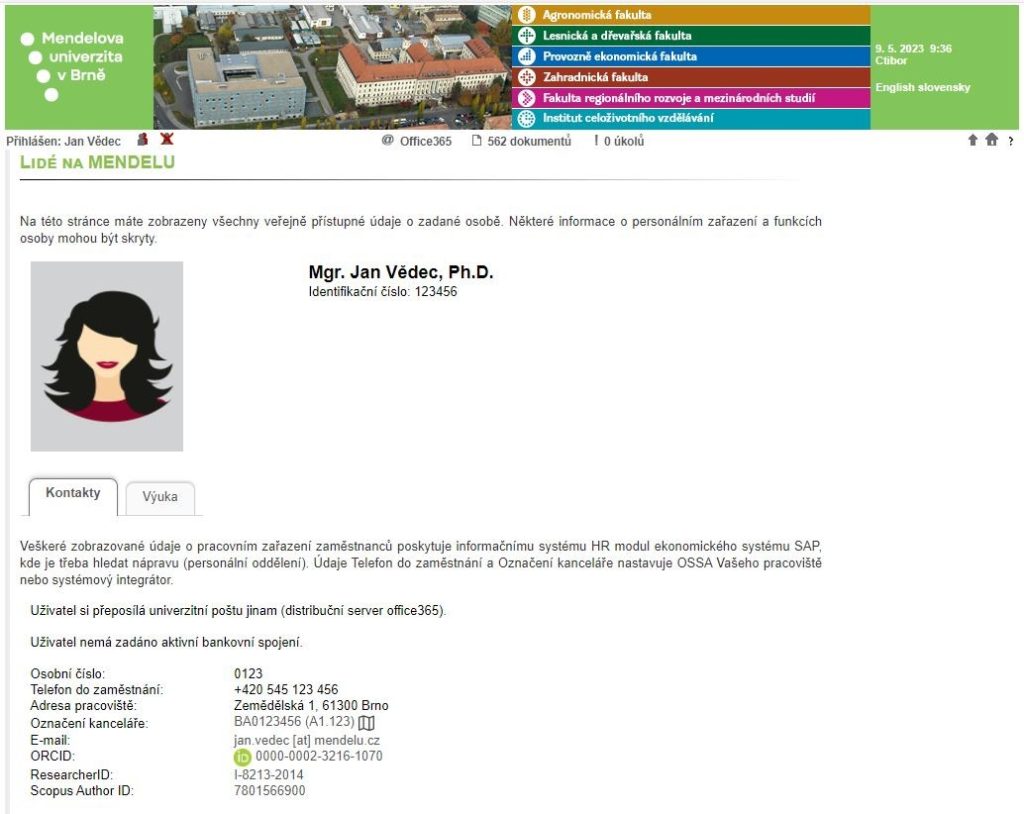Authors: Open Science Centre, Mendel University in Brno
Mendel University in Brno (MENDELU) is a Czech university with a long tradition of excellence in the fields of study of agriculture and forestry. Since the 1990s, the university proudly bears the name of Gregor Johann Mendel, the founder of modern genetics.
The university has 5 faculties (Faculty of AgriSciences, Faculty of Forestry and Wood Technology, Faculty of Business and Economics, Faculty of Horticulture, Faculty of Regional Development and International Studies), 8,900 students and 1,500 employees. Mendel University in Brno has been a member of ORCID since 2020. In 2023 the university joined the Czech ORCID consortium.
Researcher Identifiers
Researcher identifiers are a very important tool for the self-presentation of authors. At the university, it was not clear how the authors were using their identifiers. There are number of namesakes among the authors, some of them from the same faculty. Identifiers help to distinguish between them. During the recording process, we discovered that some scientists do not use their identifiers or are not up to date. On the other hand, we found that some researchers have the same identifier three times and use them randomly. Therefore, it was a priority for the university to find a complex solution for their recording and management.
For the recording and management of researcher identifiers are responsible two employees of the Open Science Center (formerly of the Library), which is part of the Department of Scientific and Pedagogical Information and Services at Mendel University in Brno. The centre provides mainly methodological support for Open Science, and identifiers are part of this support. Open Science Centre records the researcher identifiers in a Personal Bibliographic Database, which is a central registry of research and development at the university. From the Personal Bibliographic Database, the results of research and development together with the researcher identifiers are sent to the Register of Information on Results (RIV). This recording system serves as a basis for the ORCID integration into the university systems.
According to the Rector’s Regulation 1/2021: International Researcher Identifiers, all researchers are required to use ORCID iD and report all existing scientist identifiers to the library for record purposes. The use of ORCID iD for all researchers is required and researchers report their identifiers to the Open Science centre. In most cases, scientists had no problem accepting the regulation and new employees report their identifiers. Because of that, most of the identifiers were recorded (approximately 70 %). However, it is important to focus on communication with employees who do not work full-time at the university (extern researchers, etc.).
First of all, MENDELU wanted to support their researchers. The ORCID integration aimed to help researchers update their ORCID Records for university Affiliation and new publications.
Application
To integrate ORCID, an internal application MENDELU was created that connects ORCID, the Personal Bibliographic Database, and the university’s information system. The application allows the staff of the Open Science Centre to update the ORCID records of authors.
The application displays information about the authors:
- Recorded ORCID records
- Current affiliation and workplace of the researcher
- Given permissions of the authors (authorization) to MENDELU Library
- Comparison of publications in ORCID and the Personal Bibliographic Database
For the Open Science Centre employees, it was important that the application is able to send researchers automatic emails about the ORCID registration and to give permission to the library so that the Open Science Center could update their ORCID profile.
It is essential to be able to filter information in the application. There are filters for the author’s workplace (faculty, department), researcher status: (employee, student, extern), and the year of publication.
- Thanks to the integration, the application can send the author’s current affiliation from the university information system to the author’s ORCID profile:

- The application sends the record of publications from the Personal Bibliographic Database to the author’s ORCID profile:
It is important for researchers that their identifiers are visible. Researcher identifiers are also part of the author’s profile in the university information system. Furthermore, ORCID iD appears in the metadata in the university repository of research and development results.

Every ORCID member has access to the Member Portal, where is displayed how many profiles are part of the university integration and the statistics of added affiliations and publications. We use these statistics to evaluate the management of ORCID at the university.
Author’s permission to the MENDELU Library
To update the ORCID record, the author has to grant permission to the MENDELU Library. Without permission, the library cannot update the author’s ORCID record. This part is the most time-consuming. In addition to promoting the ORCID identifier itself, it is also important to directly ask the authors for permission to update their ORCID record.
At first, we asked authors via the application where we had prepared an e-mail template with the author’s unique permission link. However, the emails ended up in spam. Therefore, we decided to add a “give permission” button on the website of the Open Science Center https://uvis.mendelu.cz/en/orcid. This solution works well.

An employee of the IT department (0.2 FTE) prepared the integration and the application in cooperation with the Open Science Centre. At the beginning, it was important to agree on which information is important regarding the author’s publishing activity: correct affiliation, what the publication records should contain according to publication standards, etc. The integration was successfully completed in seven months.
What is in the future?
We would like to expand the functionality of the application, especially to be able to send information about projects to the author’s profile. We would also like to focus on less frequent forms of publication: for example, R_SOFTWARE, Nmap_SPECIALIZED MAP, and P_PATENT.